
In a way, training your new wingman in a supersonic F-16 fighter is no different than training your young ball players: development is your first priority. At a moment’s notice, your destiny might end up in the hands of one of these young competitors. Regardless of whether you’re on the diamond or in an air battle, you must build and develop their survival-based skill sets.
The late Coach Merl Eberly of the Clarinda A’s summer baseball program was quoted in The Baseball Whisperer on the state of summer college ball, “Coaches need to get back to teaching the game,” lamenting the commitment level of the players and urging the masses to renew commitments to hard work, integrity and responsibility. Eberly, who oversaw the A’s for five decades and helped develop Ozzie Smith, Bud Black and Von Hayes, also questioned whether players “knew what it took in 10 months to provide a summer program for them.” That was in 1997!
Ultimately, summer collegiate baseball is about player development.
A vital step in building your summer player development plan is to build your “Standards of Excellence”. In most cases, you’ll only have your players for 6-10 weeks, and you’ve got to hit the field running! These Standards will build a foundation for your players, your staff, and yourself. Hold each other accountable and commit to developing your ball players.
Building Trust
You’ve got to build trust between you, the player, his family, his college coach. Everyone has to be on the same page. Does your player have the character that will represent you and your franchise the same way as he does his own college? Is he there to develop as a player and a young man too? It takes a long time to build character and a moment to shatter it. Make sure you do your homework on the players that you’re going to be bringing into your community and in some cases, the homes of your host families!
Communication
You, the player and his coach must agree on what the emphasis areas are in developing his skills. It’s more than just “getting reps and innings” that benefit the player. Quality coaching equals quality development.
Self-Assessment
Summer ball statistics are great, but self-assessment is a much greater tool to help a player make the travel roster, earn a starting role or get drafted. A critical, every day approach to honestly assess one’s performance is a key ingredient to developing and improving your game.
"Team-Ship”
‘We’ over ‘me’: Are we all rowing in the same direction – day in and day out – to achieve our goals? Players have to be bought in to the concept that if the team wins, everyone wins. Setting the table for summer ball success all begins with your Standards of Excellence. Your players’ ability to learn how to set and maintain high standards is key to their development on the field and more importantly, off of it. Just like in the Air Force, where details and high standards are a way of life.
The challenges are many. Leaders will rise, and players will follow with a good game plan, which starts on Day 1. Remember: Development is Priority #1!
McConnell is currently the Head Coach of the Cortland Crush of the New York Collegiate Baseball League.